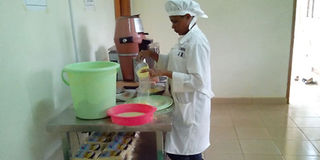The missing link in funding, nurturing agribusiness start-ups

An incubatee working on her project. Start-up enterprises in the agribusiness require physical infrastructure in addition to funds. File photo
What you need to know:
So far, Curad has started, supported and natured 71 small- and medium-scale enterprises (SMEs). There are over five technologies commercialised, two organisation models developed and upscaled, 189 interns, over 2,000 jobs created and positively impacting more than 5,000 farming households
In Uganda, agribusiness—more than any other industry—has the potential to reduce poverty and drive economic growth.
The agricultural sector is a major source of food, income and livelihood for more than 70 per cent of the population. As such, incubation is a critical tool to create competitive businesses.
In agribusiness, incubation has proven to be successful for launching new enterprises by creating an environment where start-ups can be nurtured and allowed to flourish.
Experience from Asia and Africa indicates the success rate of incubator-launched businesses is above 85 per cent.
The incubator greatly improves chances of survival of start-up businesses during the first three years, when they are most vulnerable
It is against this backdrop that the Consortium for Enhancing University Responsiveness to Agribusiness Development (Curad) aims at job creation among women and youth, and boosting incomes using an agro-enterprise development model.
So far, Curad has started, supported and natured 71 small- and medium-scale enterprises (SMEs). There are over five technologies commercialised, two organisation models developed and upscaled, 189 interns, over 2,000 jobs created and positively impacting more than 5,000 farming households.
The gaps
However, though private sector support has been harnessed to expand incubation activities, there are gaps that have been identified over time. These are elaborated as follows.
There is the dearth of organisations willing to support and fund start-ups and idea-stage innovations.
This is the riskiest part of business development that incubation endeavours to fill. But most development partners, equity funds and accelerators in Africa do not have the mandates to do so.
They look to support SMEs that have been in existence for three to five years with clean cashflows, established markets, among others.
Who is supposed to develop this deal flow? Who nurtures the youth-led start-up to the level where it can attract these funds?
All major funds in Sub-Saharan Africa seem focused on this client who is mature and ready to expand. Leaving a huge gap for thousands of youth who are willing to start such enterprises.
Government, development partners, banks and private sector need to support incubators so that they can support the “deal flow” for expansion-ready businesses.
Relying on the odd donor to start and support an incubator for a few years is not sustainable.
A joint effort by all parties, who will benefit from flourishing SMEs, is need for real change and youth job creation to be achieved.
Another key gap that needs to be filled is the provision of suitable production spaces/unit, greenhouse space or farmland.
Agribusiness incubation is a unique type where hot desks and work spaces common in university-supported incubators in Europe and US is not your right incubation facility.
Key needs
In agribusiness incubation, there is a dire need for production units akin to mini-factories and/or green houses or agricultural land.
These are the core physical assets required to deliver sustainable agri-enterprises.
Youth farmer innovators need the right production space to produce quality certified products that can trade locally and for export. They need a green house or just a piece of land to start up their enterprises.
Not only are these facilities essential, they are also crucial in generating fees to sustain activities of the incubator.
Most agri-incubators in Uganda and their promoters often disregard these key infrastructure needs. They often model their set-ups to ICT-like incubation environments. Development partners normally exclude any such capital acquisitions.
Thus despite the demand for agribusiness incubation in Uganda, government, private sector and development partners have not come to terms with the actual needs of sustainable incubators to create the much-needed jobs and agro-value chain development.
Provision of full business development services to incubatees without facilities can never yield solid results.
About Curad
Curad is a public-private organisation promoted by Makerere University, the National Union of Coffee Agribusinesses and Farm Enterprises (Nucafe), and National Agricultural Research Organisation (Naro).
It is one of the six agribusiness incubators in Africa that was formally started by the Forum for Agricultural Research in Africa (FARA) under the former UniBRAIN-Danida programme.
Registered a non-profit company, which limited by guarantee, it is geared towards starting and supporting profit-oriented youth- and women-led agribusinesses.
Curad was voted the leading incubator in Africa in 2015 by the African Agribusiness Incubators Network (AAIN).




